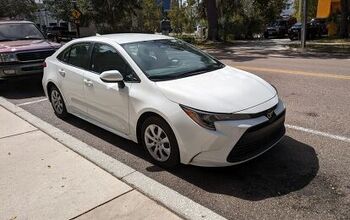Phelan is Insane: "Chrysler Looks for a New Buyer"
We’ve already put Detroit Free Press writer Mark Phelan through the Cassandra-o-meter— and found his logic more than slightly wanting. Today’s column reveals that Phelan’s cluelessness runs deep. Contemplating the collapse of the GM – Chrysler merger, Phelan says “Finding a foreign buyer to provide advanced engineering for sophisticated small vehicles in exchange for access to Chrysler’s U.S. dealer network and expertise in trucks, minivans and big cars is the best option.” Of course, Phelan’s theory assumes that an automaker would want to buy Chrysler. While everyone and their proverbial mother believes that Jeep is some kind of brand babe, other than that, what would be the point? How do we prod thee with a ten-foot pole? Let me count the ways. First, the U.S. automotive market is dead in the water. Second, any automaker stupid enough to assume tens of billions of dollars of ChryCo debt and obligations to a union (whose primary expertise is in wresting said benefits from overpaid execs), not to mention a roster of uncompetitive products and nothing in the propduct pipeline (although I just did), is also hurting in the worldwide auto industry meltdown. Third, if said automaker wants a piece of Chrysler, they’ll wait for the now-inevitable Chapter 11 or 7 and buy the best bits for pennies on the dollar. Phelan’s take? A ChryCo sale (as such) could happen. But that would suck. “Even in that best of all possible worlds, however, Chrysler will be a smaller company than it is today. It will have fewer plants and employees, but it can remain a major contributor to the U.S. economy and an important center of engineering and design expertise for a healthy global company. We can hope Chrysler’s next owners will value it more than the last two did.”
More by Robert Farago
Latest Car Reviews
Read moreLatest Product Reviews
Read moreRecent Comments
- Jrhurren Worked in Detroit 18 years, live 20 minutes away. Ren Cen is a gem, but a very terrible design inside. I’m surprised GM stuck it out as long as they did there.
- Carson D I thought that this was going to be a comparison of BFGoodrich's different truck tires.
- Tassos Jong-iL North Korea is saving pokemon cards and amibos to buy GM in 10 years, we hope.
- Formula m Same as Ford, withholding billions in development because they want to rearrange the furniture.
- EV-Guy I would care more about the Detroit downtown core. Who else would possibly be able to occupy this space? GM bought this complex - correct? If they can't fill it, how do they find tenants that can? Is the plan to just tear it down and sell to developers?


































Comments
Join the conversation
The Chrysler and Dodge brands are now pretty much completely worthless thanks to years of neglect and abuse. Jeep may have some residual value, but it is small. Thirty years ago almost nobody did what Jeep did ... now, most companies are there. Just as Volvo once owned massive mind-share for safety, and lost it as others got into that game, so it is for Jeep. Toyota, for example, could make a cheap and cheerful simple Wrangler clone tomorrow if they felt like it and would easily meet the worldwide demand for that class of vehicle. The classic FJ40 was at least the equal of the comparable Jeep in it's day, and perhaps better. Tata is also well positioned with the Land Rover brand to make a classic simple off-road 4x4. Jeep is toast. Packard, Stutz, Pierce-Arrow and others were once valuable brands as well ... until they weren't. Looking forward a bit, Harley-Davidson is likewise in a miserable strategic position. The average Harley buyer gets a year older every year, and eventually stops buying. Today's young motorcycle enthusiasts buy Japanese or even European super bikes full of technology. Harley today is where Cadillac and Lincoln were a decade or two ago. But, ask any Brand Guru and they will tell you that the Harley Davidson brand is worth a fortune because of all the logo crap it sells. But, brands have to constantly be reinvigorated and beat their competitors in order to avoid fatal decline. "in the event of a part-out strategy, how are the liabilities allocated" In a parting out strategy, only certain assets of the company are sold to new buyers. Normally the liabilities stay with the original company. Any cash from the asset sales is in theory available to partly pay off the liabilities. Typically the liabilities all stay with the corpse of the old company and some liquidation settlement is made to parcel out the cash from asset sales amongst those with claims. There are a whole set of legal priorities as to who is in line for cash, and a bunch of lawyers would get paid to argue the details in front of the courts. Only an idiot would buy Chrysler lock-stock-and-barrel including the outstanding liabilities. Cerberus, to put it mildly, blew it. Hubris, gets 'em every time.